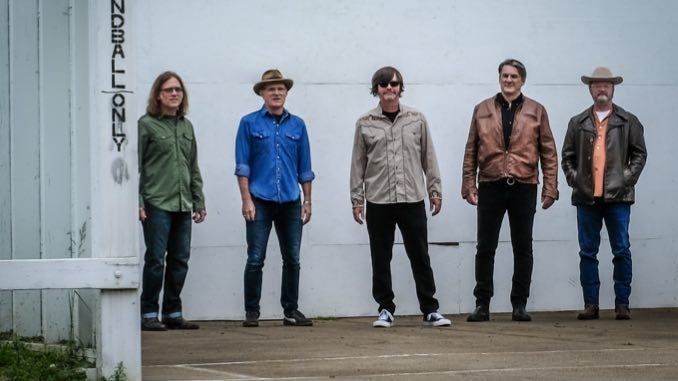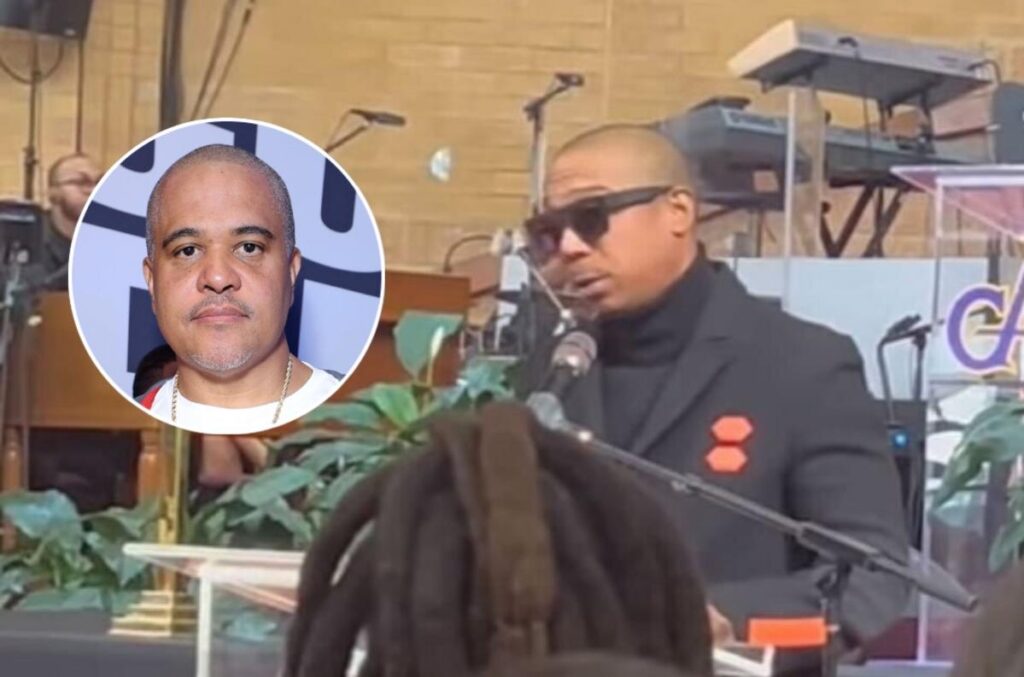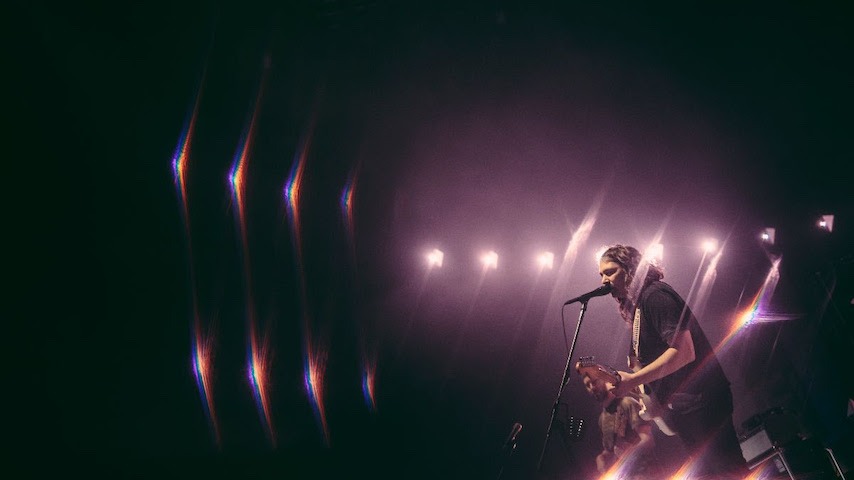During the pandemic, while Son Volt frontman Jay Farrar was writing and recording his band’s new Electro Melodier set—their 10th, named for two rare vintage amps whose tones he’d always enjoyed—he found his ears growing increasingly keen to the natural noises around him in his native St. Louis. Every time he would water his plants, he would hear the same eerie, unsettling rumble, although he never traced its theoretically amphibian origin. “I think it was some huge bullfrog, because my neighbor has a little goldfish pond,” he now reckons. “But, man, that is one weird-assed sound!” Wild neighborhood foxes used to disturb his sleep with their otherworldly nocturnal yowling, too. But mainly, lockdown introduced him to countless species of fine-feathered friends that he had never noticed before.
“I got this whole new appreciation for birds, because parks were the only places we were allowed to go there for awhile,” says the singer, who has his own charismatic, Dylan-askew trill, one of the most unique in modern rock. In particular, he started paying closer attention to Missouri’s indigenous cardinals, and was amazed to notice how their calls varied from city to city. “There are a lot of cardinals around St. Louis, obviously,” he says. “But just traveling an hour away to Columbia, the same bird had completely different songs over there! And I thought, ‘What the hell is up with that?’ So I had to do a search, and apparently that’s the case—the cardinals learn almost regional dialects from their parents, until regional dialects actually develop among birds.” He laughs at the unexpected revelation. “And that sort of blew my mind! I thought they all had the same damned song!” Ironically, his own regional Midwest charm—dialect included—is probably why Farrar, at 54, has amassed a huge alt-country cult following dating back to his early spirited years (1987-’94) with Jeff Tweedy in Uncle Tupelo; launching Son Volt with its 1995 debut Trace finally shone the spotlight on his own more laconic persona; the two strong stage personalities separating proved perfectly advantageous for both.
On Electro Melodier, for instance, Farrar and his sterling band (Andrew Duplantis, bass; Chris Frame, electric guitar, bouzouki; Mark Paterson, drums; and Mark Spencer on everything from lap steel to Weissenborn) can easily accelerate from lonesome acoustic balladry (“War on Misery” and “Diamonds & Cigarettes,” an ode to his wife of 25 years) to chiming and/or raunchy rock riffs in “Reverie,” “Sweet Refrain,” and a bluesy “Arkey Blue.” The vocalist’s steadfast, climate-change-concerned socio-political beliefs—which he fully expressed on his last Son Volt magnum opus, 2019’s Union—can amplify in a heartbeat, as well, on the subtly scathing indictments “The Globe,” “Livin’ In the USA” and “Lucky Ones.” “Too early for the lifeboats / But be mindful of what’s in store,” he sagely warns humanity, which, it empirically follows, can’t possibly be lucky for very much longer. His chordings might sometimes be oblique, but Farrar’s phraseology is simple and straightforward, a dialect so easy to understand, possibly even his local cardinals get it. Uh, no explanatory tweet required.
Paste: It’s kind of an unusual anniversary coincidence, isn’t it? 25 years have gone by since your Son Volt debut Trace, and your marriage is now in its 25th year, as well. Was there a correlation, like, “Honey—the album’s coming out! Let’s get hitched!”
Jay Farrar: Ha! You know, I guess there was a correlation there—it seemed like it was a good idea at the time, you know? And 25 years later, it still seems like a good idea. So here we are.
Paste: What brought you guys together? How did you meet?
Farrar: My wife and I met in high school, so our relationship goes back even further, to not quite 10 years before our marriage, but close to it. But we grew up in the same cultural background, we just have a lot in common, and we’ve been there together through all the travails, I guess you would say. We both grew up in Belleville [Illinois], and her family actually came from a smaller town in Illinois, and my family came from a smaller town in Missouri, so I guess there’s a shared cultural experience there somehow.
Paste: It’s an empty husk now, but did you ever eat at Noah’s Ark restaurant in St. Charles, Missouri? It was a marvel of roadside Americana, shaped like a giant ark with a gangplank you would walk up to get in, and huge animal statuary everywhere. We’d always stop there, driving cross-country on summer vacations.
Farrar: Somehow I never made it there, but I think I do remember seeing signs for it.
Paste: Did you go on vacations when you were a kid?
Farrar: No. My dad worked for the Army Corps of Engineers, but one of the most memorable vacations was when he was stationed out of New Orleans for awhile, and I was probably seven years old or something like that, and just experiencing Mardi Gras and New Orleans, in general. That left a big impression. And I did wind up living there briefly, going back to the 25 years thing, back in ’95. So it was 26 years ago, and I lived there for one year.
Paste: Obvious question, though—to what would you attribute both your marriage and your band’s longevity?
Farrar: You know, I just always hoped that there was an inherent need to create something, going way back to Uncle Tupelo. That’s the driving force for me, just the ability to be able to create. And every year I know, “Okay—back to songwriting, back to the written page.” And in terms of marriage, I just think, well, certainly during the pandemic, we all leaned on each other pretty heavily, and I’m thankful that we had each other to lean on. And some of the songs I think kind of reflect that. And at times during the pandemic there can be that feeling of … you can feel it as essential, you know? As a musician that isn’t playing music, there’s definitely a bit of an existential feeling there. And live performance can be cathartic, but I’ve been away from that.
Paste: Do you guys have kids?
Farrar: We do. One’s out of college, and one’s in college. She goes to school in St. Louis, at a university here.
Paste: When you say you sense that it’s time to write again, do you actually feel an album coming on now? Every three years or so?
Farrar: I think so. There’s definitely a cycle that seems to repeat every year and a half, you know? And then the touring cycle repeats after that. So I would say that the creative cycle follows right around with all of that, so every year and a half, the observations go from observations to being put down on paper and being recorded, little bits of snippets of songs and lyrics to just starting that creative part of the process, where you’re putting the songs together. And this time around, I guess to summarize it, what would make this recording different is just that there was more time to do the actual songwriting, because normally there’s always one eye on the horizon looking forward to the next gig, and usually the recording was just kind of put between gigs. But this time around, there was a full focus on recording—in terms of songwriting, in terms of doing vocals. There’s a couple of other elements that were different—we did try doing the Zoom-type recording on one song, “These Are the Times.” So that song we did Zoom-style recording. But it definitely felt like that synergy is lost, and that chemistry is lost, so we kind of developed a hybrid style of bringing the rhythm section guys, Andrew and Mark, up from Texas, and we all recorded together with masks. But then Mark Spencer, who has his own studio in New York, he recorded his parts on his own. So he was kind of free to roam about the cabin, which is different, because normally I’m right there with him, making suggestions. But I think it allowed for a bit more experimentation on Mark’s part, so that would be our team element. We’ve been working together as a band for quite a few years with the same lineup and the same engineer, Jacob Detering here in St. Louis, and the same mixer, John Agnello, so a lot of the components were all there.
Paste: “Rebetika,” both lyrically and musically, has this almost vintage Stephen Foster feel, or sparseness to it.
Farrar: I just came across that word, and I actually know much about the style of music, but that term was used to describe a type of Greek folk music that seemed kind of cool to me. But the song really doesn’t have anything to do with Greek folk music. But I think that’s just Mark Spencer playing some nice Weissenborn on that. And I’m primarily Irish and English myself, with all sorts of other stuff thrown in the mix. But I’ve had a bouzouki for a while, and there’s a local radio station here that plays Balkan-type music, so I hear quite a bit of that from time to time.
Paste: You may have been preparing to go into a new songwriting cycle when the pandemic hit. But was an enforced cycle fluid or totally jarring for you?
Farrar: Well, Son Volt was fortunate, I think, in that—going back to talking about the touring cycle and the recording cycle and the creative cycle—we had at least toured the U.S. once behind Union, the previous record, so it wasn’t as much of a shock as it probably could have been. So I especially empathize with those folks that had records ready to go right when the pandemic hit. So in that sense, we were fortunate, and yeah, I just tried to make the best of the down time by writing these songs and making a recording, all while just hoping that things open up again.
Paste: How many songs were written during lockdown? “Reverie,” for sure.
Farrar: I would say all of them were. And the earlier batch were probably songs like “Sweet Refrain,” and then that sort of evolved into songs like “The Globe” and “Livin’ In the USA,” where my initial approach was to try to pivot a bit away from the previous Son Volt recording, which was the quote-unquote “more political” Union. So I thought it was important to focus on what originally inspired me, like electric, uptempo melodic-type music, whether that’s Big Star or The Beatles or whatever. So I at least tried that approach, and came up with songs like “Reverie” and “Arkey Blue.” And I read the paper a lot, so eventually politics seeps into some of the songs, like “Livin’ In the USA” and “The Globe.” But I do feel like it was a more balanced approach, overall.
Paste: How did you get your daily news? From actual newspapers?
Farrar: No, just offscreen. Just through screen things. I’m an addict. Ever since the first iPhone came out, that’s the way I’ve been digesting it. I’m not saying it’s the right way—I’m just saying it’s the easy way.
Paste: “Reverie” opens the album with “The system grinds dreams to dirt / But the truth walks naked upon the Earth.” Those are some pretty brutal ideas you’re getting just staring out the window.
Farrar: I suppose so. And again, yeah, we were all experiencing those feelings, feelings of existentialism and wondering what’s gonna happen. So yeah, lots of feelings of uncertainty found their way into this writing. And “The Globe” was probably written later in the spring, when the Black Lives Matter protests were going on.
Paste: Was there a song on the record that was the turning point, where you felt yourself begin to brighten again?
Farrar: Now that you ask the question, I think “The Globe’ probably represented that for me, as being emblematic of what I wanted the record, as a whole, to sound like. And in choosing a title like Electro Melodier that would suggest that aesthetic. So I think “The Globe” was written pretty early on, and then the others came after, like “Reverie” and …and …
Paste: Certainly the global-warming-themed “Livin’ In the USA,” where you sing, “We’ve all got fossil fuel lungs / While we run out the clock.”
Farrar: Yes. And that one—that one’s never gonna go away. That’s in the paper every day, whether it’s floods or 20- or 30-year droughts. So yeah, that’s something I’m always thinking about, and something I’m always reading about.
Paste: And you’re making a statement in “The Levee on Down,” that maybe Andrew Jackson wasn’t such a swell guy at all?
Farrar: Yeah, it’s time to talk about Old Hickory. And obviously, Harriet Tubman is in the works to replace him, but that seems like it’s gonna be awhile. But yeah, there’s some semi-local history around here, like the Trail of Tears crossed over the Mississippi down by Cape Gerardo, which is about 90 minutes south of St. Louis, so I was just kind of touching on some of those geographic points of interest, and that song came out of it.
Paste: One thing this record makes clear is that your voice is really a very unique instrument, something they just wouldn’t comprehend in the auto-tune world or on American Idol.
Farrar: Thank you. But right as I was finishing up the recording, I had to go in for a couple of surgeries, actually, and one was to my throat, so I knew that I had to get all the singing done—it was essentially nodes that had to be taken out. So again, I think I focused on it a bit more. And then after that, I also had rotator-cuff surgery on my shoulder, which was due to 40 years, I would say, of playing the acoustic guitar too much. But just like pitchers in baseball, I got it repaired and now I’m back.
Paste: Final question—what did you learn from this past year that’s made you a better writer? Or even just a better person, in general?
Farrar: Um, things I’ve learned? Well, to pass the time, I’ve learned how to make limoncello, which is an Italian lemon drink. When all of the hand sanitizer wasn’t available because it sold out early on in the pandemic, I bought some Everclear and never wound up using it as hand sanitizer, so I made limoncello out of it. But I think overall, I think I just learned how to integrate mindfulness a bit, into everyday living, maybe much more so than before. It was all about just taking a step back and doing some breathing.




